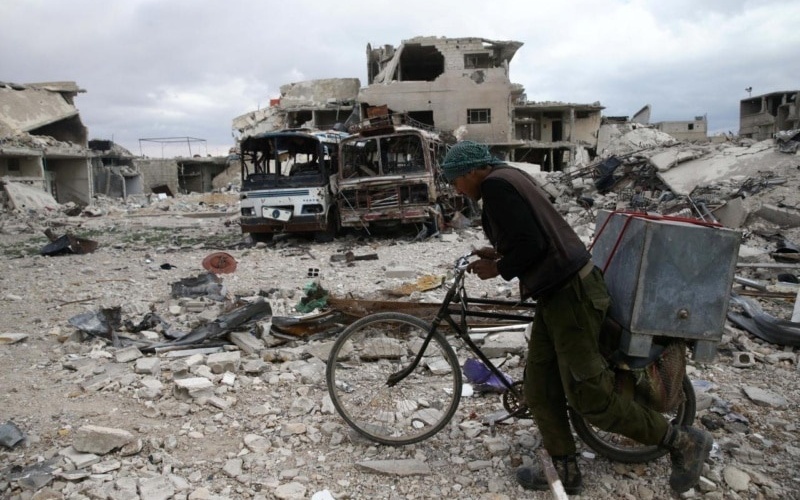“To talk in one specific way for seven years, then to turn back on all that overnight….It’s something that makes me both laugh and cry.”
THURSDAY FEATURE
- Turkey and Rebels Must Stop Violations Against Residents in Afrin — Amnesty
Residents of East Ghouta near Syria’s capital Damascus, recaptured by pro-Assad forces in April, spoke to Syria Direct of “unlearning the language of revolution” so they can survive under the Assad regime’s control.
Samer Yasseen, 27, explains how he made the mistake of not unlearning quickly enough, when he visited the regime’s newly-established Outer Damascus administrative office last month.
Yasseen hopes to register for university in the capital, but faced a possible barrier. He asked the regime official, “What’s going to happen with army service postponement, now that guys from the liberated territories can finish their studies?”
The regime official, ranking at the concept of areas “liberated” from the regime since 2012 before they were reoccupied by the pro-Assad forces this spring, asked, “You mean the territories that were under control of the terrorists?”
Yasseen corrected his error: “No, I mean the territories that were liberated from the terrorists.”
Choosing new words and new stories has been a necessity for residents who want to stay out of detention, let alone try to pursue work and education. Thousands of people were taken into regime camps after the fall of East Ghouta, following an intense two-month campaign of ground assaults, chemical attacks, and Russian and regime bombing. Those who remained reportedly signed pledges not to criticize the regime and its officials.
That concern has been reinforced in recent weeks by the growing revelations of the many thousands who have been killed or died from inhumane conditions in prison, as the regime begins to notify families over civil records.
“Assad Bread”
“Seven years under the control of a certain militant group or…a certain policy — you get a dialect that’s tied to your living conditions,” says Abd al-Rahman Murad, a mechanical engineering student from Douma.
During the time of opposition rule, bread — often scarce during a regime siege of more than five years — was simply “khubz”, the Arabic word.
“But bread that was brought in via aid convoys, or from the regime’s bakeries — we called it ‘khubz Assadi’ (‘Assad bread’),” says Murad.
Abu Raed al-Hassan says he still returns to some of the vocabulary during the years of uprising, but behind closed doors with his wife and three children: “You say things like ‘regime,’ or ‘revolution,’ or ‘back when we were besieged’.” And, remembering friends and relatives killed in the 89-month conflict, he uses “martyred”.
But, he explains, “Outside the house it’s impossible for me to make a mistake. Every word might be taken into account.”
“Don’t Ask About Anyone”
When Mohammad Rateb, 33, was removed from East Ghouta to Idlib in northern Syria in April, he sent a WhatsApp messages to family members who stayed behind: “Hey, how are you guys? What’s new?”
He immediately got responses of caution: “The first thing they said was: ‘Don’t talk any nonsense. 22Don’t ask us about anyone.”
He now says that people can talk “about everything except for revolution, regime, and armed groups.” If politics is discussed, “my people” and “your people” are used for “opposition” and “regime”.
“They are sitting in the [regime’s] lap. Every word is accounted for,” Rateb says.
“Everything is Good!”
So how do East Ghoutans now greet each other in public?
Abu Raed al-Hassan laughs, “Everything is good!”
Abd al-Rahman Murad is not smiling when he says he takes care to avoid the word “revolution”.
“To talk in one specific way for seven years, then to turn back on all that overnight….It’s something that makes me both laugh and cry,” Murad says.
(h/t to Ammar Hamou and Madeline Edwards of Syria Direct for interviews and original story)
UN Team Inspects Near Israeli-Occupied Golan Heights
A UN team has gone into the area in southwest Syria near the Israeli-occupied Golan Heights for the first time in the 89-month conflict.
The team was escorted by Russian military police, following the recapture of the territory by a pro-Assad offensive.
UN peacekeepers were responsible for monitoring a 1974 zone of separation, following the 1973 Arab-Israeli War, between Syria and Israel.
Meanwhile, the Israeli military said it carried out an airstrike against several ISIS fighters who had infiltrated the zone and were 200 meters from the Israeli-controlled Golan.
#Pt. UN delegation in #Quneitra moved in coordination with #Russia|n MP. Area remains highly sensitive: past hours Israel carried out an airstrike & Jordan fired artillery on suspected IS fighters. Russia also considering establishment of several posts. S. #Syria. pic.twitter.com/WV8Eq7l4dq
— Qalaat Al Mudiq (@QalaatAlMudiq) August 2, 2018


Impossibile to post with this new layout
Oh it worked 🙂
Whatsapp is encrypted or they can use Telegram. Or instead of focusing on the nonsensical “revolution” better concentrate on food, health, rebuilding etc